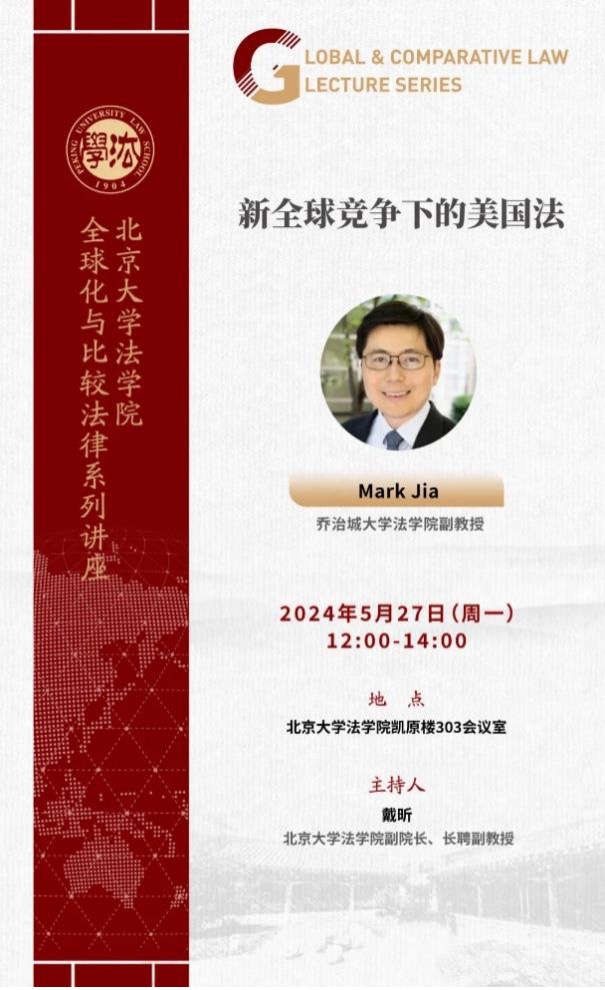Mark Jia: American Law in the Context of New Global Competition
Date:2024-12-24
On May 27, 2024, Mark Jia, A. P. at Georgetown University Law Center, delivered an academic lecture titled "American Law in the Context of New Global Competition" as part of the Globalization and Comparative Law Lecture Series at Peking University Law School. The lecture was chaired by Professor Dai Xin, Vice Dean of Peking University Law School, with dozens of faculty and students from within the university in attendance. The event received an enthusiastic response.

This article presents the core points of the lecture as a transcript.
Mark Jia:
I. Changes in Civil Rights
With ongoing international competition, strategic interactions with other countries have led to many changes in U.S. law regarding civil rights. Historically, during World War II, the U.S. severely restricted the civil rights of Japanese Americans, and during the Cold War, the U.S. enhanced the rights of minorities to counter Soviet political propaganda.
Today, international competition continues to shape civil rights norms in U.S. law. For example, the U.S. government initiated the so-called "China Initiative" from 2018 to 2022, conducting targeted investigations against specific groups. Some U.S. states have passed legislation restricting citizens of certain countries from purchasing real estate. In recent years, the U.S. government has taken actions against TikTok, which could affect civil rights under the First Amendment.
II. Changes in Power Structure
International competition can also lead to changes in the power structure. Executive power has been continuously expanded in the context of international competition. From the Obama administration to the Trump administration and the Biden administration, presidents have increasingly issued executive orders to address international competition. Correspondingly, the courts have actively or passively participated in international competition. For example, in cases involving TikTok and WeChat, the courts actively discussed the legality of specific executive orders issued by the president.
Another point of interest is the convergence of executive and legislative powers and the bipartisan consensus on this matter. In the U.S. political system, it is often difficult for the two parties to reach agreement on a particular issue, but external international competition may bridge such divisions on specific topics. For instance, the two parties in Congress have repeatedly reached consensus on expanding presidential powers under national security, and they also unanimously agreed to expand the powers of U.S. administrative bodies such as the Committee on Foreign Investment in the United States (CFIUS).
III. Decline of Legal Rationality
In the changes to individual rights and the power structure, legal rationality itself may gradually decline, and what were once formally neutral laws are more likely to align with foreign policy. For example, after the Pearl Harbor attack, the U.S. Supreme Court largely complied with the decisions of the Roosevelt administration, including confirming the legality of the restrictions on the civil rights of Japanese Americans.
Currently, U.S. law has begun to show signs of this shift. A typical example is that U.S. courts, when recognizing and enforcing foreign judgments, have started discussing issues related to foreign legal systems based on policy documents from the U.S. Department of State. This action undoubtedly reflects the erosion of legal neutrality by political positions.
IV. Q&A Session
Question 1:
You mentioned that both parties have reached a consensus on international competition, but the images, cases, and other evidence used to argue this are mainly actions taken by the Republican Party. Is the conclusion that both parties have a consensus reliable?
Mark Jia:
Even motions led by Republicans often receive bipartisan support in practice. Of course, there are many Democrats who oppose some of them.
Question 2:
The changes in U.S. law mainly concern national security and foreign relations, which are relatively distant from ordinary people. Will international competition ultimately affect ordinary Americans?
Mark Jia:
In addition to national security and foreign relations, international competition has also led to changes in areas such as U.S. immigration law, which could have a more profound impact on ordinary Americans.



